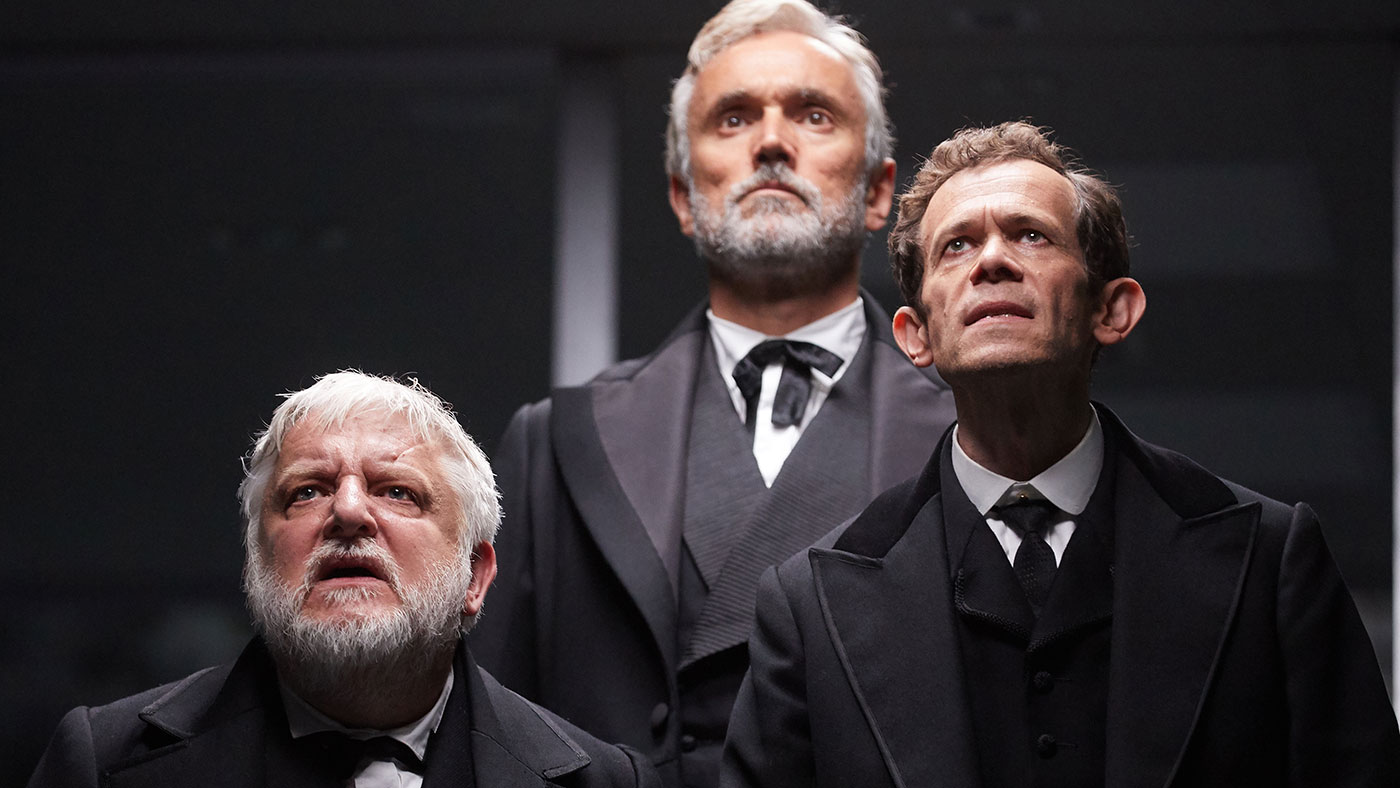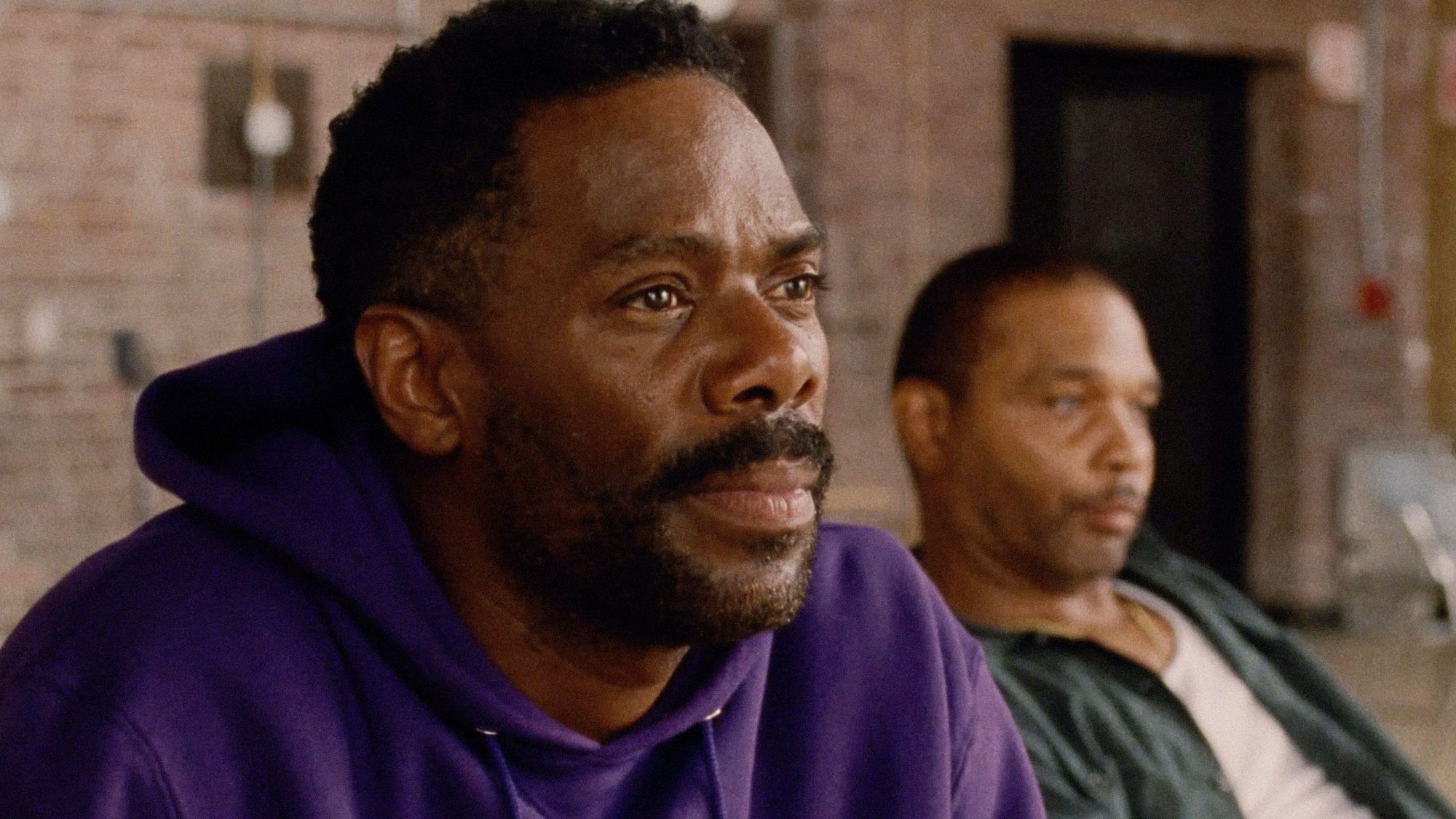The Lehman Trilogy review: the rise and fall of a Wall Street institution

A free daily email with the biggest news stories of the day – and the best features from TheWeek.com
You are now subscribed
Your newsletter sign-up was successful

A three-hour play with only three actors about the rise and fall of an investment bank that doesn’t directly deal with its high-profile demise might seem like a hard sell. But even if you have no interest in finance, you should definitely go and see The Lehman Trilogy, now running at the National Theatre.
Adapted by Ben Power from Stefano Massini’s play and directed by Sam Mendes, it tells the story of how three brothers, Hayum “Henry” (Simon Russell Beale – pictured below), Mendel “Emanuel” (Ben Miles) and Mayer (Adam Godley) Lehman emigrated to America from Germany and founded a small store that would in time become a major investment bank.
The Week
Escape your echo chamber. Get the facts behind the news, plus analysis from multiple perspectives.

Sign up for The Week's Free Newsletters
From our morning news briefing to a weekly Good News Newsletter, get the best of The Week delivered directly to your inbox.
From our morning news briefing to a weekly Good News Newsletter, get the best of The Week delivered directly to your inbox.
The trilogy is essentially three smaller one-hour plays, each one focusing on a single generation of the Lehman family, with some overlap between them.
In the first play, the trio set up a clothes shop in Montgomery, Alabama, but they soon realise that there is a gap in the market for a firm which can act as middlemen between the cotton plantations of the South and the factories of the North. Even when the Civil War threatens to disrupt their business they manage to survive and then prosper in the immediate aftermath. Realising that the future lies in New York, they move from Alabama and broaden their business into other commodities.

The second part, covering the late 19th century and the run up to the Wall Street Crash, details the Lehmans’ moves away from commodities and into banking, under the direction of Philip Lehman, Emanuel’s son. Philip’s foresight and analytical mind enables him to correctly anticipate which industries will need capital, so enabling the bank to prosper by helping finance them. Sadly, even he is unable to resist the lure of the 1920s stockmarket boom, and his attempt to become an investment company leads to the bank facing near extinction as markets start to tumble.
In the final part, Bobbie Lehman takes over the reins from his father. However, while his ruthless attitude and injection of outside capital ensure the company’s survival, it also means that the family are forced to relinquish control of “their” institution. Meanwhile, his cousin, Herbert Lehman (Mayer’s son), gives up banking for politics, ironically becoming part of the effort to tame the unbridled capitalism that caused the crash and the subsequent Depression. When Bobbie dies in 1969, he is succeeded by an outsider. The firm quickly becomes dominated by traders and is bought and sold repeatedly until its demise in 2008.
A free daily email with the biggest news stories of the day – and the best features from TheWeek.com
As you’d expect, the play uses Lehman’s evolution as a metaphor for wider changes in America’s economy and society. Another major theme is the conflict that the Jewish community (and indeed all immigrants) face between assimilation and holding on to tradition. This is underlined by frequent references to Jewish scripture, with Bobbie’s attempt to turn the firm into an international powerhouse likened to the Tower of Babel. Similarly, while Henry’s death in 1855 results in the shop being shuttered for ten days, by the time of Bobbie’s demise in 1969 the traders can only afford to tear themselves away from the their screens for just three minutes of reflection.

The three actors use a mixture of narration and acting to tell the story, playing multiple roles, both male and female and young and old, as required, using body language and accents to distinguish characters. If Beale, Miles and Godley weren’t so convincing and versatile, this could have been a problem, but their performance is so strong that the audience is able to suspend their disbelief. Limiting the cast to three actors (plus a brief cameo by Dominik Tiefenthaler who plays a janitor) enables the play to flow much more quickly than would be possible had there had been breaks to allow for multiple entrances and exits.
Similarly, the decision to stage the action in the boardroom of Lehman on the eve of its final collapse also helps keeps the play moving at a fast pace. Another benefit is that it ensures that the bank’s ultimate collapse is never far from the audience’s mind. This is particularly useful when Bobbie refuses to take part in a private post-crash rescue effort because he believes that the authorities will only act once there have been enough bankruptcies to satisfy the public’s need for a scapegoat. To this day, many Lehman insiders argue that the Federal Reserve allowed Lehman to collapse in order to help pave the way for a larger bailout.
The way the set is designed also allows Sam Mendes to effectively deploy special effects at key moments, for instance by having the stage revolve. The only downside to this is that occasionally the actors end up delivering their lines behind a glass wall, which means that they end up muffled.
Overall, this is an intelligent, moving play that will appeal to a wide range of people, and should be on your list of productions to see.
The Lehman Trilogy is adapted by Ben Power from the play by Stefano Massini and is directed by Sam Mendes. It runs at the National Theatre until 20 October. Tickets are available from nationaltheatre.org.uk.
This article was originally published on MoneyWeek.com
-
 One great cookbook: Joshua McFadden’s ‘Six Seasons of Pasta’
One great cookbook: Joshua McFadden’s ‘Six Seasons of Pasta’the week recommends The pasta you know and love. But ever so much better.
-
 Scientists are worried about amoebas
Scientists are worried about amoebasUnder the radar Small and very mighty
-
 Buddhist monks’ US walk for peace
Buddhist monks’ US walk for peaceUnder the Radar Crowds have turned out on the roads from California to Washington and ‘millions are finding hope in their journey’
-
 Friendship: 'bromance' comedy starring Paul Rudd and Tim Robinson
Friendship: 'bromance' comedy starring Paul Rudd and Tim RobinsonThe Week Recommends 'Lampooning and embracing' middle-aged male loneliness, this film is 'enjoyable and funny'
-
 The Count of Monte Cristo review: 'indecently spectacular' adaptation
The Count of Monte Cristo review: 'indecently spectacular' adaptationThe Week Recommends Dumas's classic 19th-century novel is once again given new life in this 'fast-moving' film
-
 Death of England: Closing Time review – 'bold, brash reflection on racism'
Death of England: Closing Time review – 'bold, brash reflection on racism'The Week Recommends The final part of this trilogy deftly explores rising political tensions across the country
-
 Sing Sing review: prison drama bursts with 'charm, energy and optimism'
Sing Sing review: prison drama bursts with 'charm, energy and optimism'The Week Recommends Colman Domingo plays a real-life prisoner in a performance likely to be an Oscars shoo-in
-
 Kaos review: comic retelling of Greek mythology starring Jeff Goldblum
Kaos review: comic retelling of Greek mythology starring Jeff GoldblumThe Week Recommends The new series captures audiences as it 'never takes itself too seriously'
-
 Blink Twice review: a 'stylish and savage' black comedy thriller
Blink Twice review: a 'stylish and savage' black comedy thrillerThe Week Recommends Channing Tatum and Naomi Ackie stun in this film on the hedonistic rich directed by Zoë Kravitz
-
 Shifters review: 'beautiful' new romantic comedy offers 'bittersweet tenderness'
Shifters review: 'beautiful' new romantic comedy offers 'bittersweet tenderness'The Week Recommends The 'inventive, emotionally astute writing' leaves audiences gripped throughout
-
 How to do F1: British Grand Prix 2025
How to do F1: British Grand Prix 2025The Week Recommends One of the biggest events of the motorsports calendar is back and better than ever